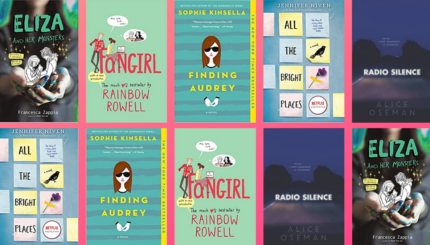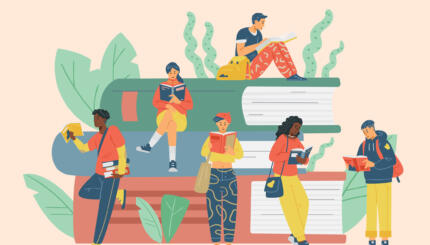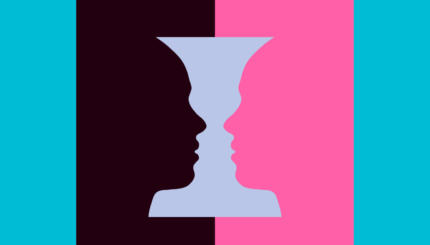Sharpie Markers. I was obsessed with these colorful little markers as a toddler, and despite what one would expect, my parents would let me bring them everywhere I went. Each and every adult figure around me was afraid that I would draw stick figures on the walls, deface their new car, or make a scribbly mess of their table. My parents, however, knew my intention was nothing but calming, peaceful, and self-centering. This rainbow of markers was my identity, and when others would deprive me of it because of fear, because of disbelief, because of stubbornness, I would fall apart.
My name is Cameron Samuels, I use they/them pronouns, and I am a nonbinary high school student who is, unfortunately, having to speak up for LGBTQ+ mental health because this is a difficult time for queer students.
Walking through the halls of my high school as a 14-year-old queer teen in Texas, it was apparent that LGBTQ+ individuals are targeted specifically for their sexuality and gender identity. I struggled immensely with my queer identity over the years, and this has continuously taken a toll on my mental health. Just like the meltdowns I would have when my Sharpie markers were taken from me as a young child, I would be troubled with gender dysphoria, low self-esteem, and a lack of supportive friends who could affirm my queer identity.
My own great grandfather, a closeted gay man, died by suicide. The Trevor Project, a suicide prevention lifeline for LGBTQ+ youth, is a resource that has saved the lives of many of my friends. No one should feel so unaccepted by others in their life to be led to this tragedy, but unfortunately, it takes a tragedy to still be somehow untouched by its cause.
Arriving at the present day, I am now a senior in high school. It had been discovered that KatyISD, my very own school district, prohibits students from accessing LGBTQ+ content like The Trevor Project from campus internet because it fit the category of “Alternative Sexual Lifestyles (GLBT).” When a student is on the verge of attempting suicide, having access to resources and a suicide prevention lifeline like The Trevor Project is a matter of life or death. These policies by my district are undoubtedly discriminatory and can make the difference between hanging out at school the next day with or losing a cherished friend.
During the past couple of months, I have been working to bring attention to this injustice by advocating for these websites to be unblocked on campus. A friend of mine created an online petition that has gathered support from more than one thousand community members, and I have spoken at school board meetings alongside fellow students. Our efforts have been covered in more than a dozen news publications, and students – those who are directly impacted by this brazen policymaking – have been at the forefront of this advocacy as we packed the board meetings’ audience room, shared our personal stories for publication, and digitally organized on social media.
There have been several private meetings I have been a part of with the school board and district administrators, and these decision-makers have made promises to unblock LGBTQ+ content that would be otherwise school-appropriate. They have since broken these promises.
The Trevor Project is merely a suicide prevention lifeline, but the district insists that it must remain blocked because of the “chat capabilities” its website contains. The district’s other justifications are that these sites are not part of the education curriculum or common classroom activities and that suicide prevention resources exist outside of The Trevor Project.
The LGBTQ+ community is a very complex and diverse group of vulnerable individuals. Each person, whether identifying as part of this community or not, has an identity that can be fluid and is certainly different from anyone else’s. The Sharpies I collected as a child may be mass produced in various colors, but each person in this world is made up of their own combination of hues, and this perfectly selected design is for them to discover and protect, not for others to decide or disrespect.
Generic mental health resources can definitely be of help to the LGBTQ+ community, but having access to resources specific to this community is imperative to promoting positive welfare for queer students and empowering themselves for success. By blocking The Trevor Project with illegitimate justifications, queer students are not provided with the resources they need to thrive while being affirmed of their identity.
These resources build confidence within the LGBTQ+ community because young people recognize that there is an establishment dedicated to supporting them specifically, not as a typical person but as one flourishing with pride. It is difficult to speak with someone about mental health while struggling with it, but knowing that a transgender person on the same path is out there and ready to assist a fellow trans person can be the difference between closing up or opening up about the root cause of their crisis.
Knowledge bases exist and are accessible at schools for various topics – computer science, biology, and trigonometry to name a few. When a community dedicated to learning encourages the use of the internet for researching these topics but strictly prohibits accessing information from the Human Rights Campaign and The Trevor Project, a clear message is sent that this information is not seen as educational or intended for young people to see.
Content that provides information about queer topics is vital to building strong queer individuals. So many young people do not live in hospitable homes for being part of the LGBTQ+ community, and school is often the only place for students to research these topics in hopes of learning more about themselves and their identities. Adolescence is a precarious time for defining oneself, and having access to this plethora of affirming information on the internet is imperative to supporting the LGBTQ+ community.
Tolerance has become more widespread over the last few decades, but acceptance and inclusion still remain overlooked. The LGBTQ+ community needs advocates and allies to progress the welfare of its members – to support their mental health, their self-esteem, and their integration into a diverse society. Students, as you walk the halls of your school, be there to support the mental health of your peers. Be there to advocate for LGBTQ+ individuals when they cannot advocate for themselves. We can certainly shape a world where rainbows can shine, but we must first begin with laying a foundation of compassion.






